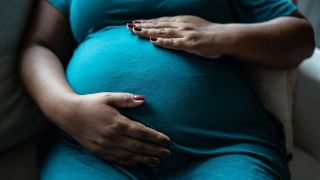Maternal death rates doubled in the past 20 years in the US
Maternal mortality rates in the U.S. progressively worsened from 1999 to 2019, a new study finds, and Black populations face the greatest risk.

Maternal mortality rates in the U.S. dramatically worsened from 1999 to 2019, a new study finds.
The research, published in July in the journal JAMA, reveals maternal mortality rates more than doubled in the U.S. in the past 20 years and bolsters existing evidence that certain racial and ethnic groups are at a greater risk of maternal mortality than others. The study used data on deaths and live births from the National Vital Statistics System and generated estimates of maternal deaths by state, race and ethnicity from 1999 to 2019.
Black people consistently had the highest maternal mortality rate across each year studied, and the largest increase in rate over the study period was seen in American Indian and Alaskan Native populations.
In the study period, the median rate of maternal deaths per 100,000 live births increased from 26.7 to 55.4 in the Black population and from 14.0 to 49.2 among American Indian and Alaska Native populations. Rates rose from 9.6 to 20.9 among the Asian, Native Hawaiian and other Pacific Islander populations, from 9.6 to 19.1 among Hispanic people, and from 9.4 to 26.3 among white people.
Related: 900% increase in babies born with syphilis in Mississippi may be part of nationwide trend
"When you think about what do Black people and Indigenous people have in common, one of the greatest factors is systemic racism," said Dr. Amanda P. Williams, clinical innovation adviser at the California Maternal Quality Care Collaborative and an adjunct professor at the Stanford University School of Medicine.
Systemic racism in the U.S. affects where people live and work, which also impacts their access to quality healthcare and likelihood of developing various diseases. The Centers for Disease Control and Prevention (CDC) states that, in part due to these factors, Black women are three times more likely to die from pregnancy-related causes than white women.
The overall rates of maternal mortality are far higher in the U.S. than in other industrialized countries. According to the study's findings, there were an estimated 12.7 maternal deaths per 100,000 live births in the U.S. in 1999. In 2019, this rate more than doubled to 32.2 deaths per 100,000 births. By comparison, Canada currently reports 10 deaths per 100,000 live births, the U.K. reports 9.6 deaths per 100,000 births, and Norway and Denmark report 2.7 and 2.4 deaths per 100,000 births, respectively.
Myriad factors contribute to America's high maternal mortality rates, Williams said. These include issues surrounding access to adequate health insurance; the lack of wraparound services, such as lactation, nutrition, mental health support and home visits; and the lack of community support and social services aimed at supporting patients during and just after pregnancy, she said.
Multiple factors also influence why some races and ethnicities face a greater burden of maternal mortality in the U.S. For example, preeclampsia, a high blood pressure disorder that occurs in late pregnancy, is one of the leading causes of maternal mortality worldwide. Recent research has shown that U.S.-born Black women are at a greater risk of preeclampsia than those who immigrated to the country, suggesting that social and cultural factors in America, not race alone, also influence such health disparities.
While the study findings are alarming, there are initiatives underway to reduce maternal mortality rates and address the observed disparities. An increasing number of states are extending the period in which new mothers can qualify for Medicaid postpartum, for example, and there's been a recent push for implicit bias training, a measure now mandatory for all California-based providers caring for patients immediately before and after birth.
Broad structural changes will take time to implement, so Williams offered advice for patients contending with America's current medical system. "Never encounter the medical system alone," she advised. "Always bring someone with you who has your best interest in mind."
She recommended seeking providers of similar race or ethnicity, due to data from other medical fields that suggest clinical outcomes improve when patients and their providers share similar backgrounds. Finally, Williams encouraged patients to explore opportunities for wraparound services and community support, although again, access to these services can be hard to come by.
Live Science newsletter
Stay up to date on the latest science news by signing up for our Essentials newsletter.
Sarah Moore is a freelance science writer. She has an MSc in neuroscience and a BSc in psychology from Goldsmiths College, University of London. Sarah has experience in academic research and has worked in medical communications with top pharmaceutical companies. As a freelancer, she has contributed work to a wide range of publications. Sarah loves to write on all areas of science, from healthcare to nanotechnology but she is especially intrigued by the workings of the human brain.
Most Popular

By Tom Metcalfe


By Keith Cooper

By Sascha Pare